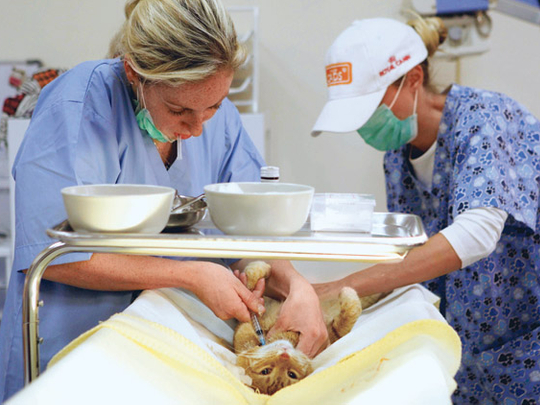
Sharjah: More than 500 cats have been neutered since February, as part of an ongoing campaign to reduce the number of feral cats in the city of Sharjah.
Gulf News on Monday followed the Cat and Dog Shelter staff as they trapped, neutered and released cats near the Sharjah International Airport.
"We try to catch at least 10 stray cats a day, and within six months we expect to notice a significant decrease in the population throughout the city," said Sharjah Cat and Dog Shelter director Emma Cresswell.
Cresswell said all trapped cats were released the same day.
Staff lured the stray cats into the traps with cat food and scattered dried fish.
Once the cats were trapped, they were taken to the shelter to be neutered.
"Before we neuter them, we check for feline leukaemia and feline Aids," Cresswell said.
"Once we check that they are all negative, we then carry out the operation."
Cresswell said all cats were anaesthetised before the sterilisation was carried out.
Cresswell said up to 15 cats were operated on a day, and that the reason feral cats were released back to their environment was to keep down the city's rodent population.
CADS, which is near the Sharjah International Airport, is responsible for reducing the number of feral cats in the emirate of Sharjah and currently works under the umbrella of Sharjah Municipality.
"The municipality previously used to distribute [rat] poison to people's homes but that was very harmful since children could also be affected by the toxins.
"We persuaded the municipality to stop that practise since September of last year," said CADS veterinarian Dr Zoe Hamilton. Since February, CADS staff have been targeting feral cats in the areas of Al Rolla, Wanderers Club and Sharqan.
Cresswell urged residents not to feed stray cats, and not to leave aluminium rubbish containers open.
"We not only cater to cats but to dogs as well. We have seen horrific cases where dogs are injured with machetes, had their heads bashed in and beaten with sticks. In cases where the injuries are very severe, we then euthanase the animals," said Dr Hamilton.












